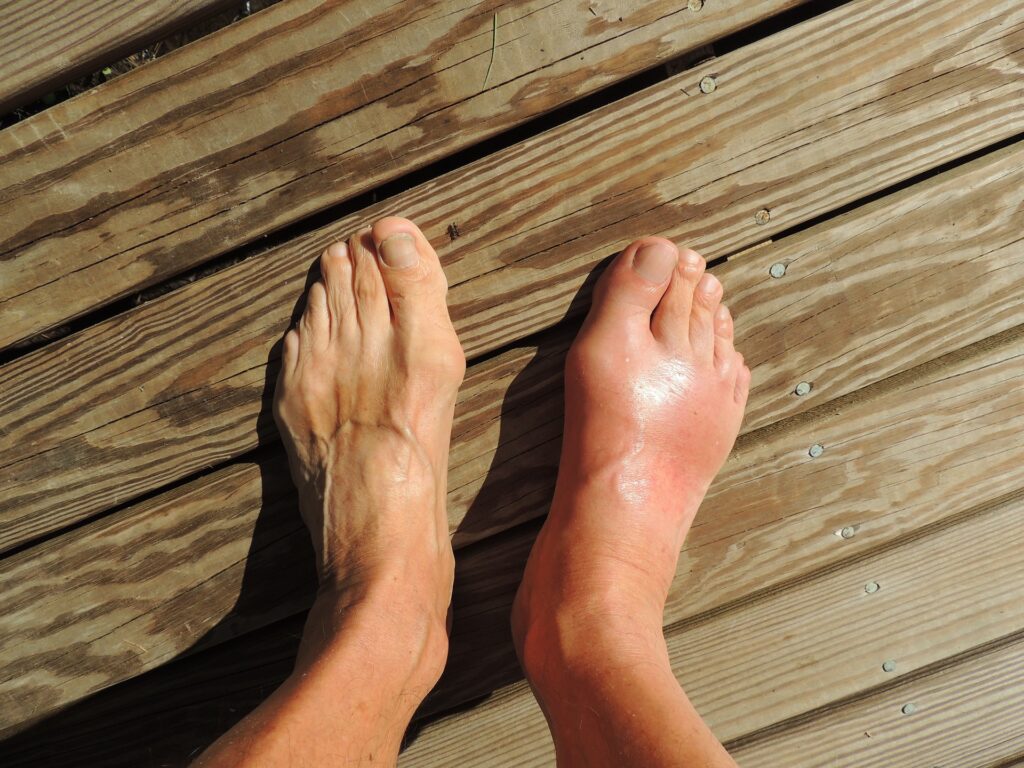What is Gout?
Understanding the Causes, Symptoms, and Treatments and home remedies of a Painful Condition
Gout is a type of arthritis that can be incredibly painful and disruptive to daily life. It is caused by an excess of uric acid in the body, which can form crystals that build up in joints and tissues. While gout can be managed with proper treatment, it is important to understand the causes and symptoms of this condition in order to seek appropriate medical care.

Causes of Gout
Gout is caused by an excess of uric acid in the body, which can occur due to a variety of factors. Some people are predisposed to developing gout due to genetics, while others may develop it due to lifestyle choices. Common causes of gout include:
- Diet: Consuming foods that are high in purines, such as red meat, seafood, and alcohol, can increase the levels of uric acid in the body.
- Obesity: Being overweight can also increase the risk of developing gout.
- Medical conditions: Certain medical conditions, such as diabetes and high blood pressure, can increase the risk of developing gout.
- Medications: Certain medications, such as diuretics and aspirin, can increase the levels of uric acid in the body and lead to gout.
Symptoms of Gout
The symptoms of gout can be incredibly painful and debilitating, and can include:
- Intense joint pain: Gout typically causes sudden, intense pain in one or more joints, often in the big toe, ankle, or knee.
- Swelling and redness: Affected joints may become swollen, red, and tender to the touch.
- Limited mobility: The pain and swelling caused by gout can make it difficult to move the affected joint.
- Fever and chills: In some cases, gout can cause fever and chills, as well as a general feeling of illness.
Treatments for Gout
While gout can be incredibly painful, there are several treatments available to help manage the symptoms and prevent future flare-ups. These treatments may include:
- Medications: Non steroidal anti-inflammatory drugs (NSAIDs) can help reduce pain and inflammation associated with gout, while medications such as colchicine and corticosteroids can help prevent future flare-ups.
- Lifestyle changes: Making dietary changes, such as reducing the intake of purine-rich foods and alcohol, can help reduce the risk of gout flare-ups. Losing weight and staying physically active can also help manage gout symptoms.
- Joint care: Taking steps to care for affected joints, such as applying ice and elevating the joint, can help reduce pain and swelling.
- Alternative therapies: Some people may find relief from gout symptoms through alternative therapies such as acupuncture or massage therapy.
Preventing Gout
While some people may be predisposed to developing gout, there are steps that can be taken to reduce the risk of developing this painful condition. These may include:
- Maintaining a healthy weight: Being overweight can increase the risk of developing gout, so maintaining a healthy weight can help reduce the risk.
- Eating a healthy diet: Reducing the intake of purine-rich foods, such as red meat and seafood, and limiting alcohol consumption can help reduce the risk of developing gout.
- Staying hydrated: Drinking plenty of water can help flush excess uric acid from the body.
- Exercising regularly: Regular exercise can help maintain a healthy weight and improve overall health, which can help reduce the risk of developing gout.
Home Remedies For Gout Pain
While medical treatment is important for managing gout, there are also some home remedies that may provide relief from symptoms. These remedies include:
- Cold compress: Applying a cold compress, such as an ice pack, to the affected joint can help reduce inflammation and pain.
- Epsom salt soak: Soaking the affected joint in warm water with Epsom salt can help reduce pain and swelling.
- Ginger: Ginger contains anti-inflammatory compounds that may help reduce inflammation and pain associated with gout. Adding ginger to meals or drinking ginger tea may provide relief.
- Apple cider vinegar: Apple cider vinegar may help reduce inflammation and balance the pH levels in the body. Adding a tablespoon of apple cider vinegar to a glass of water and drinking it daily may help manage gout symptoms.
- Cherry juice: Cherries contain compounds that may help reduce inflammation and lower uric acid levels in the body. Drinking cherry juice or eating cherries may provide relief from gout symptoms.
- Turmeric: Turmeric contains curcumin, which has anti-inflammatory properties. Adding turmeric to meals or taking a turmeric supplement may help manage gout symptoms.
It is important to note that while home remedies may provide relief from gout symptoms, they should not replace medical treatment. It is important to work with a healthcare provider to develop a comprehensive treatment plan for managing gout.
List of foods to avoid with gout
If you have gout, it’s important to avoid or limit certain foods that are high in purines, as they can increase uric acid levels in the body and trigger gout attacks. Foods to avoid with gout include:
- Red meat: Beef, pork, and lamb are high in purines and should be avoided or consumed in moderation.
- Organ meats: Liver, kidneys, and other organ meats are also high in purines and should be avoided.
- Seafood: Shellfish, sardines, anchovies, and other seafood are high in purines and should be limited.
- Alcohol: Beer and liquor are particularly high in purines and can trigger gout attacks. Wine can also be problematic for some people with gout.
- Sugary drinks: Soft drinks and other sugary drinks have been linked to an increased risk of gout and should be avoided.
- High-fructose corn syrup: Foods and drinks that contain high-fructose corn syrup, such as candy, processed foods, and sweetened drinks, can increase uric acid levels and should be limited.
- Processed foods: Processed foods are often high in salt, which can increase the risk of gout. They may also contain high-fructose corn syrup and other ingredients that can trigger gout attacks.
It’s important to note that not everyone with gout will be affected by the same foods. Some people with gout may be able to tolerate certain foods in moderation, while others may need to avoid them altogether. Working with a healthcare provider and a registered dietitian can help develop a personalised diet plan for managing gout.
Immediate gout pain relief
If you’re experiencing a gout attack and need immediate pain relief, there are a few things you can try:
- Over-the-counter pain medication: Non steroidal anti-inflammatory drugs (NSAIDs), such as ibuprofen, can help reduce inflammation and relieve pain. However, it’s important to talk to a healthcare provider before taking any new medication.
- Ice pack: Applying an ice pack to the affected joint can help reduce inflammation and relieve pain. Wrap the ice pack in a towel and apply it to the joint for 20-30 minutes at a time.
- Elevation: Elevating the affected joint can help reduce swelling and relieve pain. Prop up the joint with pillows or a cushion.
- Rest: Resting the affected joint can help reduce inflammation and relieve pain. Avoid putting weight on the joint and try to keep it elevated.
- Drink plenty of water: Drinking plenty of water can help flush excess uric acid out of the body and reduce the risk of future gout attacks.
It’s important to note that these remedies may provide immediate pain relief, but they should not replace medical treatment. If you’re experiencing a gout attack, it’s important to talk to a healthcare provider for guidance on managing your symptoms. They may recommend medication or other treatments to help manage your pain and prevent future gout attacks.











